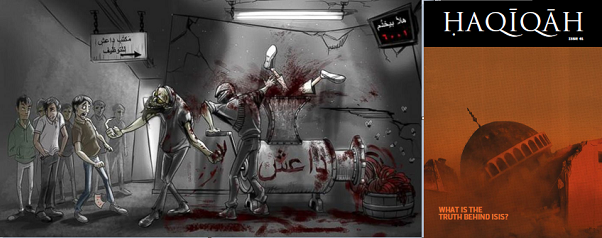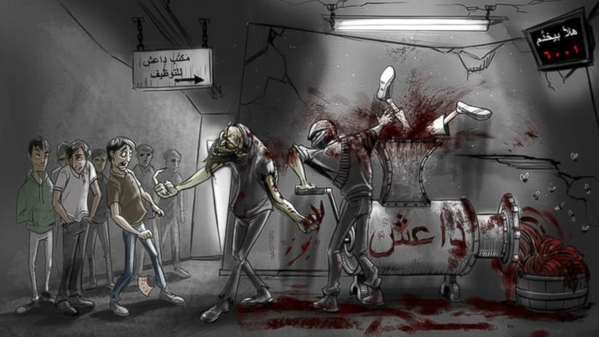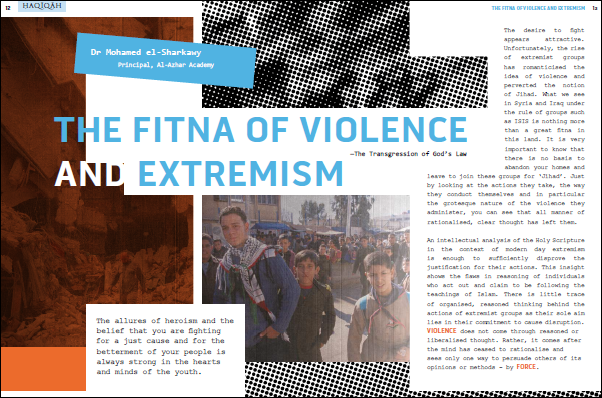A powerful, credible narrative?
[ by Charles Cameron — how about a powerful, credible foreign policy? — maybe that’s asking too much ]
.
**
James P. Farwell‘s piece in the National Interest, Information Warfare: The Key to Destroying ISIS, claims:
A coalition of Shia militias, Iraqi government forces and anti-ISIS Suncni tribesman are making progress towards ejecting ISIS from Tikrit. What’s needed now is to capitalize on those defeats and complement kinetic action with a cohesive information war campaign driven by a powerful, credible narrative that demoralizes, divides, confuses, and frustrates ISIS members in order to blunt their effectiveness as fighters, and undermine their expectations, destroy their momentum, and quash any hope of victory in creating a sustainable Islamic State or caliphate.
A powerful, credible narrative?
**
Let’s look at two recent efforts. The first was just “published from above” by the US Government:
Here’s some context and commentary, from Al Jazeera’s DC office:
On March 16 an F-15E fighter jet dropped 60,000 copies of the above leaflet on Raqqa, the base of operations for the Islamic State of Iraq and the Levant, or ISIL.
The image shows a “Daesh Employment Office” (Daesh is a pejorative nickname for ISIL in the Arab world).
Two ISIL recruiters, one of whom appears more monster than man, feed young men into a meat grinder with “Daesh” written in blood on its side. A sign in the upper-right corner reads “Now Serving Number 6,001”.
When asked about the intended message of the leaflet, Pentagon spokesman Colonel Steve Warren, said “If you allow yourself to be recruited by Daesh, you will find yourself in a meat grinder.”
Warren said the leaflet was created by the Army’s Military Information Support Operations, or MISO. Until 2010 that outfit was known as “PSY-OPS” (short for “Psychological Operations”).
Experts have questioned the efficacy and tenor of the leaflet.Faysal Itani, a Fellow at the Atlantic Center in Washington who studies the various groups fighting in Syria’s civil war, said anyone in Raqqa thinking of joining ISIL is either ideologically committed or coerced.
“Members of the first category are likely immune to leaflet propaganda, especially if distributed by an air force that has been bombing Raqqa,” Itani told DC Dispatches.
Frankly, I think that’s the wrong way to appeal to the people of Raqqa, who see worse everyday, and either don’t want or don’t need to be reminded.
**
Next up is the effort of a consortium of British Imams — a magazine called Haqiqah, whose editor pitches it thus:
We’re turning the tide – though we still have a way to go, we know that by taking efforts to support and mobilise the huge online Muslim population we will eventually drown out the violent voices
Here’s a sample double-page spread:
I would like to applaud the effort, but I’m afraid a 17-page magazine featuring text blocks in a typewriter face and the occasional poor color photograph is just no match for IS’ own magazine, Dabiq, whose first issue ran 50 pages, and which looked like this:
Ouch. Richard Barrett of the Soufan Group is gentle in the way he phrases his comment, but I’m afraid he’s also right on the mark:
New online magazine #Haqiqah a welcome effort to counter #IS propaganda but will need to improve layout and content to compete with #dabiq
— Richard Barrett (@rmdbarrett) March 27, 2015
**
Okay, let’s look at some of the possible theological “alt-narratives” I’ve seen proposed.
First, there’s the idea that losing battles might “prove” that ISIS was not divinely approved and supported — but Qur’an 2:154-56 concerns those who fight fi sabil Allah, an suggests they will encounter “tests” up to and including “loss of lives” in the course of events:
And do not say about those who are killed in the way of Allah, “They are dead.” Rather, they are alive, but you perceive [it] not. And We will surely test you with something of fear and hunger and a loss of wealth and lives and fruits, but give good tidings to the patient, Who, when disaster strikes them, say, “Indeed we belong to Allah , and indeed to Him we will return.”
Furthermore, IS’ favorite eschatological hadith (I’ve quoted it before) specifies that many will be lost, both to glorious death and inglorious desertion:
The Last Hour would not come until the Romans would land at al-A’maq or in Dabiq. An army consisting of the best (soldiers) of the people of the earth at that time will come from Medina (to counteract them). When they will arrange themselves in ranks, the Romans would say: Do not stand between us and those (Muslims) who took prisoners from amongst us. Let us fight with them; and the Muslims would say: Nay, by Allah, we would never get aside from you and from our brethren that you may fight them. They will then fight and a third (part) of the army would run away, whom Allah will never forgive. A third (part of the army). which would be constituted of excellent martyrs in Allah’s eye, would be killed ani the third who would never be put to trial would win and they would be conquerors of Constantinople
Losing ground? I think the third “alt-narrative” — the narrative brought into effect by IS losing significant ground they had previously captured, is the most powerful of those currently proffered — but it depends on perspective rather than capture or loss. Blows to IS such as the loss of Tikrit, or a fortiori the possible loss of Mosul, might seem persuasive to most western eyes, but in the eyes of potential recruits they may well be counterbalanced by new oaths of allegiance such as thos of Boko Haram and Al-Shabaab to the IS caliph.
At least, though, we glimpse here that changes in military reality may impact thelogically-based beliefs.
**
Taking that a step further, I’d suggest that credible behavior on our own part, rather than the fatwas of ulema — even Abu Muhammad al-Maqdisi, let alone those who may seem obviously compromised by complicity in power — will comprise the most effective of counter-narratives.
America supported Muslims in Afghanistan against the Russians, America supported Bosniac Muslims against the Orthodox Serbs and Catholic Croats — these are the kinds of action that most clearly refute the idea that the US is at war with Muslims — as it may appear to be in the cases Bacevich listed a few months back in a WaPo op-ed:
As America’s efforts to “degrade and ultimately destroy” Islamic State militants extent into Syria, Iraq War III has seamlessly morphed into Greater Middle East Battlefield XIV. That is, Syria has become at least the 14th country in the Islamic world that U.S. forces have invaded or occupied or bombed, and in which American soldiers have killed or been killed. And that’s just since 1980.
Let’s tick them off: Iran (1980, 1987-1988), Libya (1981, 1986, 1989, 2011), Lebanon (1983), Kuwait (1991), Iraq (1991-2011, 2014-), Somalia (1992-1993, 2007-), Bosnia (1995), Saudi Arabia (1991, 1996), Afghanistan (1998, 2001-), Sudan (1998), Kosovo (1999), Yemen (2000, 2002-), Pakistan (2004-) and now Syria. Whew.
That could be viewed as a pretty devastating list.
**
Actions — as a poet, I dread to utter these words, but they seem appropriate in this context — actions (in the form of foreign policy) just may speak louder that words .







April 1st, 2015 at 8:30 pm
Sadly, I think some of those you’ve quoted have fallen victim to what might be termed “the proportions fallacy”. If war were fought the way it was 150 years ago or even 70 years ago, they might have a point.
.
But it isn’t. We’re in war’s third or even fourth generation. The side with the greatest numbers and the greatest productive capacity doesn’t necessarily win any more.
It’s an age of personal empowerment. When one person can kill hundreds, thousands, or even tens of thousands where 150 years ago they might only have killed one, even one belligerent is too many.
April 2nd, 2015 at 1:18 am
The best counter narrative will be constructed by Daesh fighters themselves when they are convinced they are losing and at the same time convinced that they are bound to die if they keep it up. Loud proclamations of religious commitment notwithstanding, when the adventurous young men see they will die and will lose, the heart tends to fade.
.
Of course that will require actually killing a lot more of them and taking what they have, if we can be bothered to try hard. Maybe we could hire the Chadians.
April 2nd, 2015 at 4:11 am
JM Berger and Jessica Stern have a worthwhile take on countering IS messaging.